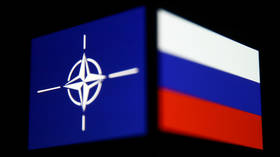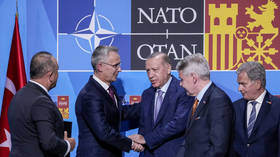Key NATO-Russia accord salvaged – Die Welt

NATO will reportedly retain the 1997 Founding Act between the military alliance and Russia, which says that the two “do not consider each other as adversaries.” According to German media, Berlin and Paris argued against axing the accord.
In a report on Tuesday, Die Welt claimed that a number of Eastern European NATO member states wanted the Founding Act on Mutual Relations, Cooperation and Security between NATO and the Russian Federation officially scrapped during the ongoing NATO summit in Madrid. The unnamed nations believe that Moscow ceased to abide by the accord in 2008, when its forces crossed into Georgia, the article reported. Germany and France, however, have insisted on retaining the “chimera of a valid agreement,” as the journalists put it in their report.
To downplay the difference of opinion, it is said that the accord will not be mentioned in the closing statement at the NATO summit in the Spanish capital.
Signed in Paris in May 1997, the act was supposed to regulate relations between NATO and Russia following the end of the Cold War. The document, among other things, sets the goal of “overcoming the vestiges of earlier confrontation and competition,” and calls for the creation of a “strong, stable and enduring partnership.”
Last Wednesday, German Chancellor Olaf Scholz said that “it would be unwise for us to terminate the NATO-Russia Founding Act.” He explained that this “would only play into the hands of President Putin and his propaganda.” According to Scholz, the document states “exactly the principles which Putin has been violating: the renunciation of the use of force, the respect for borders, sovereignty of independent states.”
Meanwhile, speaking at the start of the Madrid summit on Wednesday, NATO Secretary General Jens Stoltenberg announced the “biggest overhaul [of] our collective defense since the end of the Cold War.”
“We will agree a new Strategic Concept for our Alliance, which is a blueprint for how to take NATO into the future in a more competitive and dangerous world, to protect all Allies and close to one billion citizens,” Stoltenberg said.
He added that Russia will no longer be considered a strategic partner, and expressed confidence that the leaders of the 30 member states would “state clearly that Russia poses a direct threat to our security.”
According to Die Welt, Germany, along with several other key NATO member states, played a major role in formulating the alliance’s new guiding document – noting the designation of China as a “challenge to our security, interests and values,” – wording advocated by Berlin, Paris, and Rome. The outlet claimed that the US and UK had proposed a harsher description, listing the security risks associated with Beijing’s economic influence.













